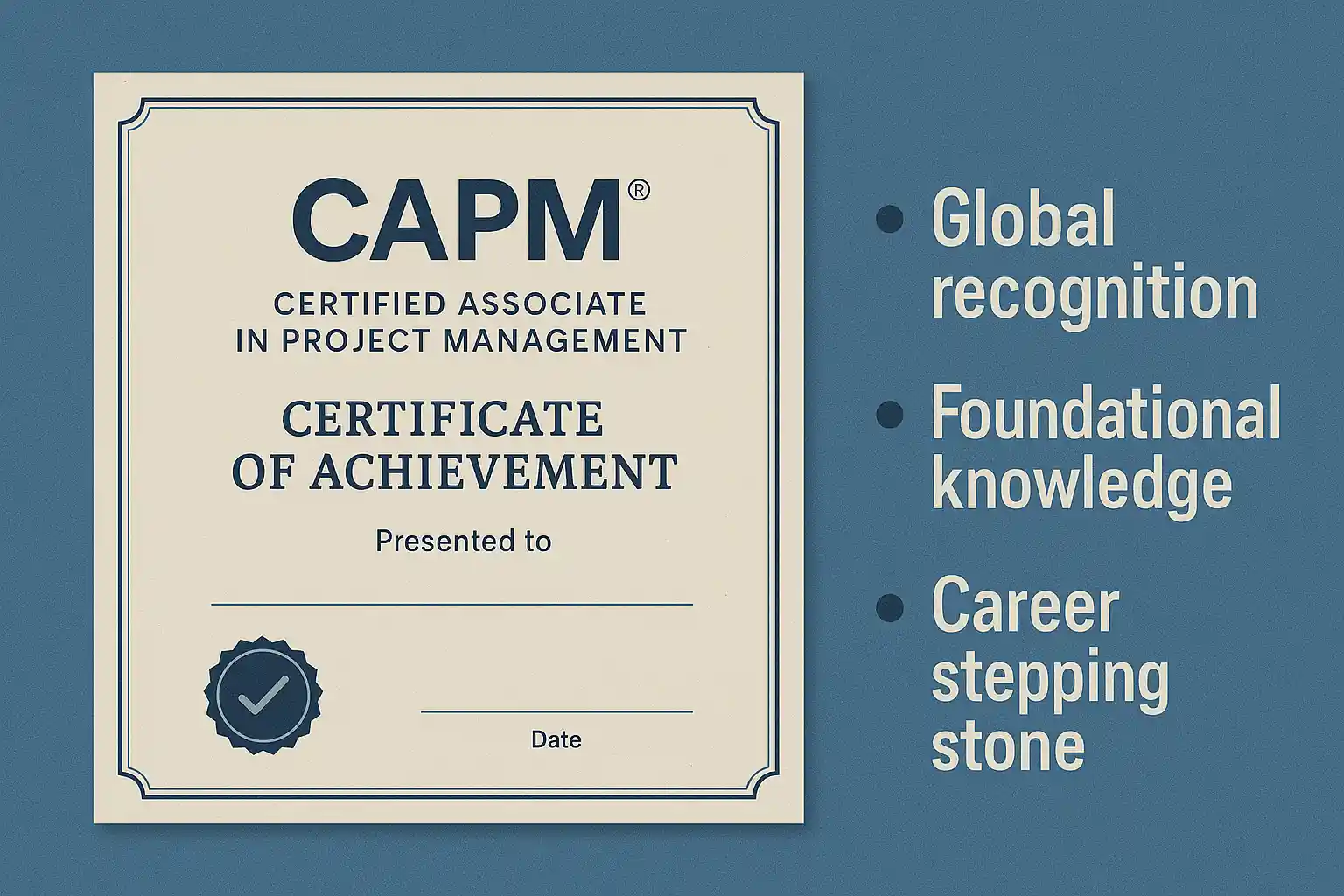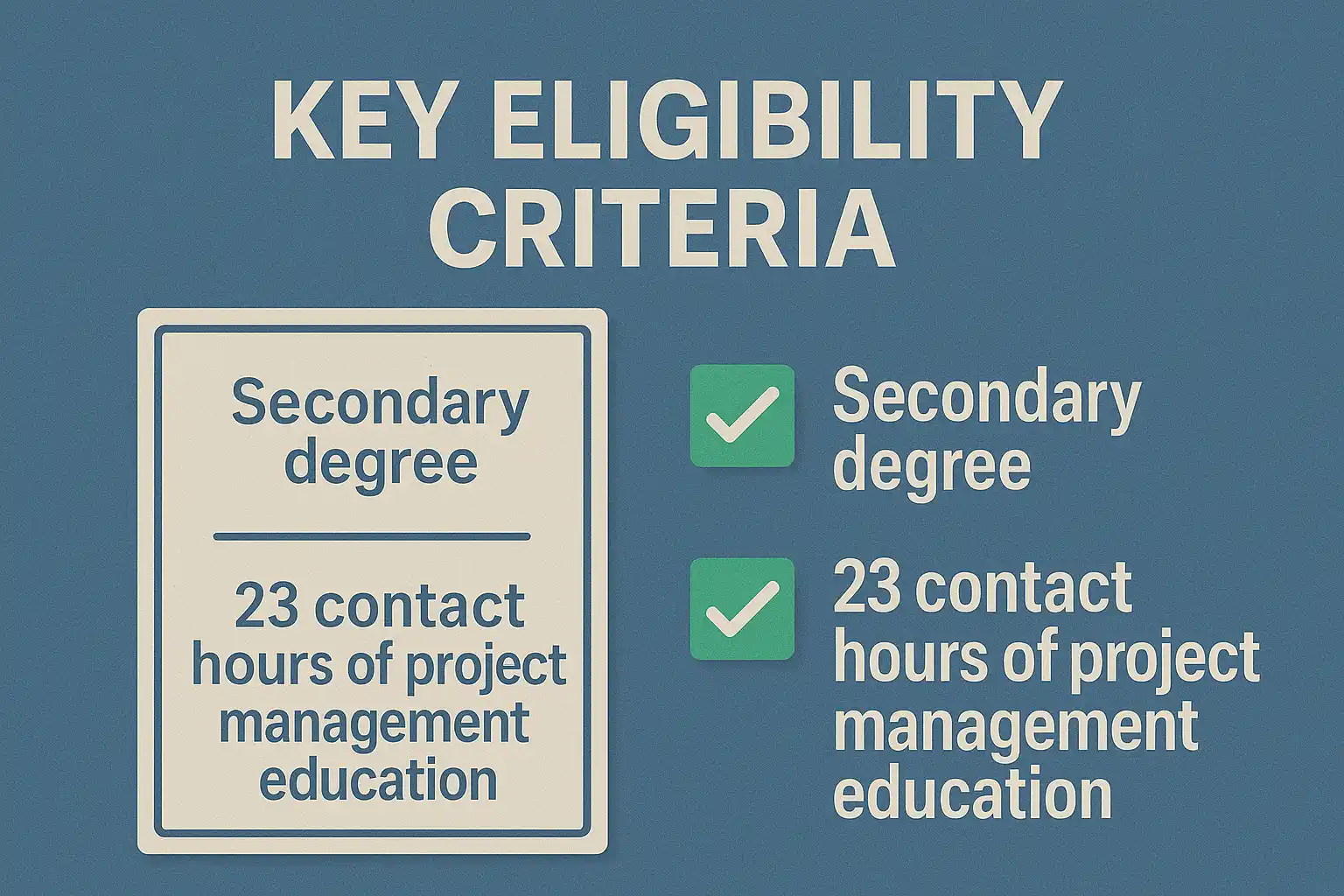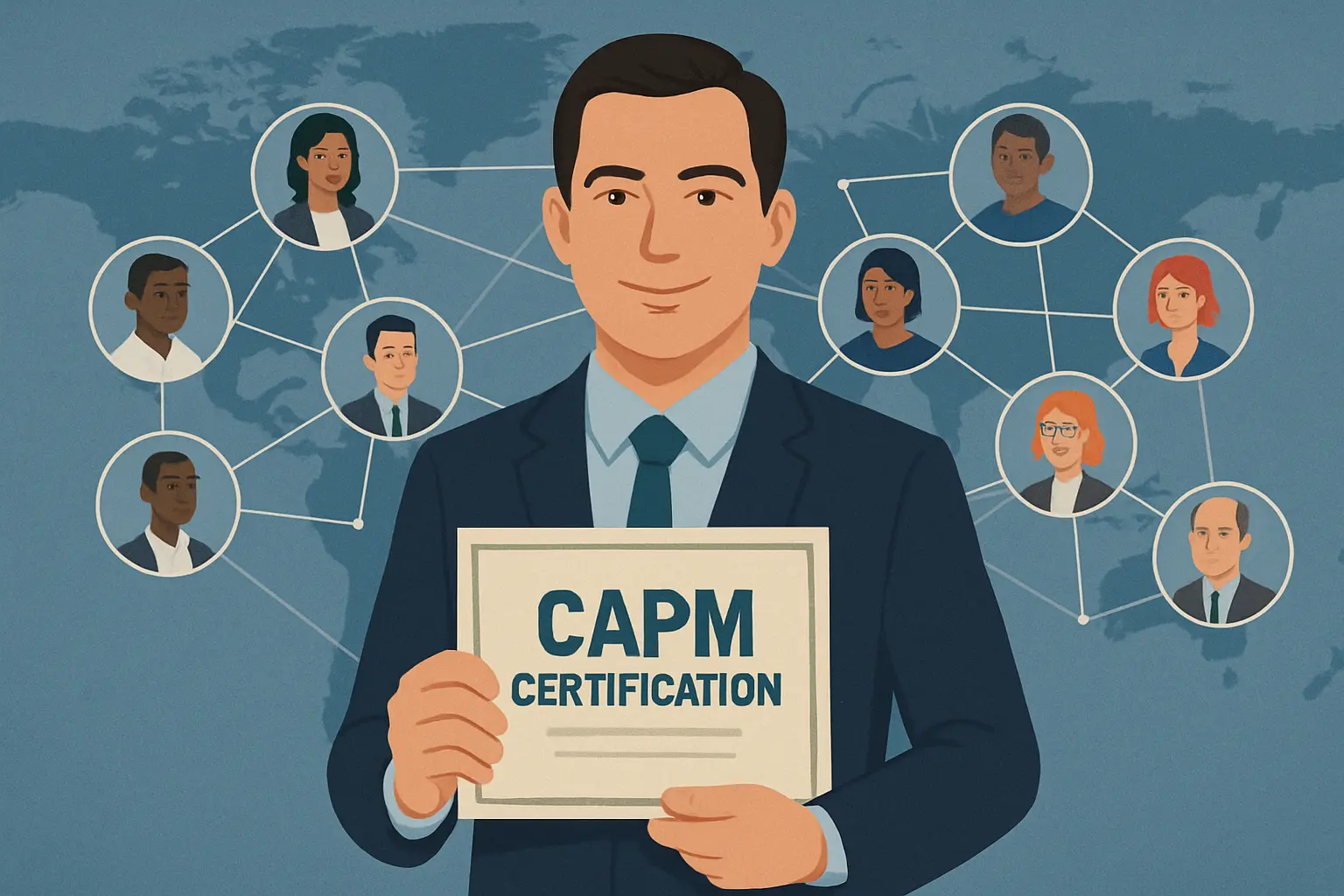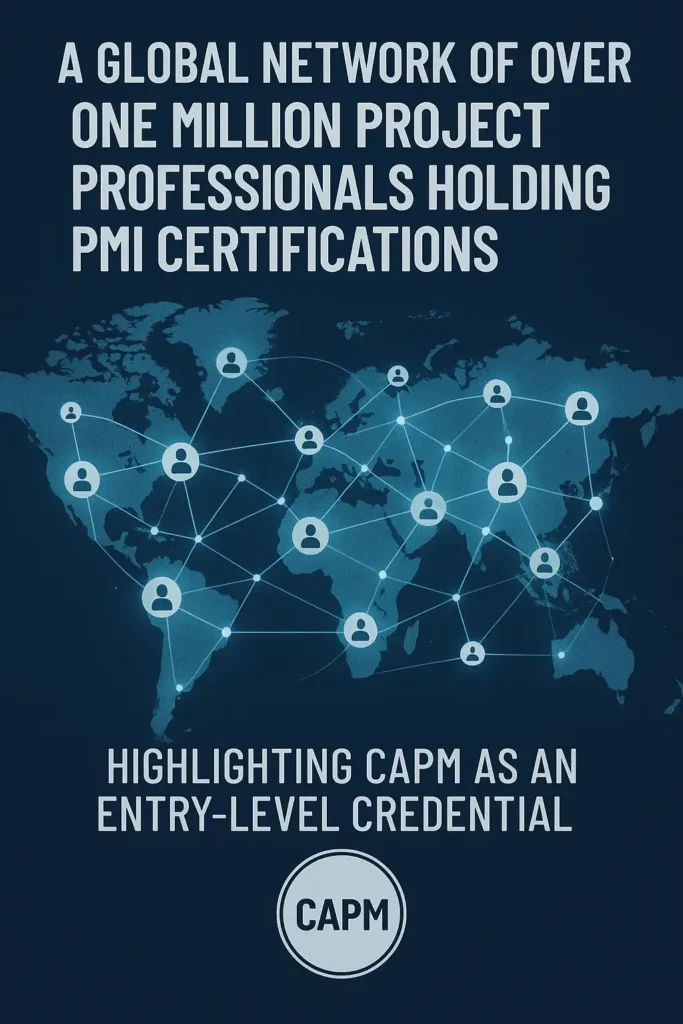Understanding the Role of PMI® in Shaping the CAPM® Credential
By: Ryan Malaluan, CAPM®; Editor: Geram Lompon; Reviewed by: Alvin Villanueva, PMP®, PMI-ACP®
Did you know that over 1 million project professionals worldwide have earned certifications from the
The PMI®-CAPM® certification is more than just a title—it’s a globally recognized credential that proves your grasp of fundamental knowledge in
Key Takeaways
- The CAPM credential validates your understanding of
project management core concepts. - It is designed for entry-level project managers with a secondary degree (such as a high school diploma or associate degree).
- PMI sets the global standard for certification in the
project management profession. - The CAPM provides a foundation for more advanced certifications, such as the PMP certification.
- You gain insights into leading and directing projects using predictive
project management approaches and agile practices.
What is the Project Management Institute (PMI)?
The
With a focus on continuous improvement, PMI plays a critical role in shaping the future of
History and Evolution of PMI
PMI emerged to standardize project processes across industries. Over the past eight years and beyond, it has developed frameworks that adapt to evolving project experience, technology, and job market needs.
This evolution reflects PMI’s commitment to staying relevant and impactful in the
These credentials ensure consistency, promote excellence, and benefit both individuals and organizations worldwide. PMI’s dedication has made it a cornerstone of modern
PMI’s Global Role
The
PMI’s standards guide professionals in directing projects, managing teams, and addressing critical areas such as risk management, time, scope, and cost control.
By continually updating its frameworks to reflect industry trends and innovations, PMI ensures that its certifications and guidelines remain relevant and practical for project professionals worldwide, strengthening the consistency and quality of project outcomes globally.

The PMI CAPM Credential: An Overview
If you’re new to the field, the Certified Associate in Project Management (CAPM) is the ideal starting point. This entry-level certification, offered by the
It demonstrates your commitment to the profession and proves you’re prepared to take on the responsibilities of managing or supporting projects. Recognized globally, the CAPM credential helps you stand out in a competitive job market and serves as a stepping stone toward advanced certifications like the PMP certification, making it a wise investment in your
Definition and Purpose
The CAPM certification is a valuable entry-level credential for individuals with limited prior experience in object management. It’s ideal for recent graduates, career changers, or professionals looking to establish a solid foundation in
By earning the CAPM, candidates demonstrate their understanding of
Additionally, it serves as a stepping stone toward more advanced credentials, such as the PMP certification, by helping candidates meet prerequisites and build confidence for future career advancement.
How CAPM Fits into PMI’s Certification Framework
The CAPM certification serves as an entry point within the
As a foundational certification, CAPM validates essential
By earning the CAPM, individuals demonstrate their commitment to the profession and gain a clear path for career progression. It often acts as a stepping stone for those seeking to grow within the
Recent Updates to the CAPM Credential
To maintain industry relevance, the
This ensures that candidates are prepared for hybrid work settings and modern project challenges. Notably, approximately half of the current CAPM exam content focuses on agile methodologies, including Scrum and adaptive planning.
These revisions align with global trends and enhance the value of the Certified Associate in

CAPM Certification Requirements
To obtain your CAPM certification, understanding the requirements is crucial. The
To sit for the CAPM exam, candidates must hold a secondary degree, such as a high school diploma, associate degree, or its global equivalent.
You must also complete 23 contact hours of
The application includes:
- Creating a PMI profile
- Submitting your educational background
- Verifying hours of
project management education - Paying the exam fee (discounted for PMI members)
The CAPM Exam Structure and Content
Understanding the structure and content of the CAPM exam is essential for adequate preparation. The Certified Associate in
It tests your understanding of key concepts, terminology, processes, and techniques used in real-world project environments. This includes both predictive
By familiarizing yourself with the exam format, domains, and question types, you can develop a focused study strategy and improve your chances of success. Strong preparation not only helps you pass but also builds lasting
Format and Timing
The CAPM certification exam is structured to assess your understanding of key
It is conducted in a proctored setting, either online or at a testing center, and tests knowledge across multiple
This structure reflects PPMI’s commitment to preparing entry-level project managers for real-world challenges. Effective time management and a solid understanding of the PMBOK Guide are essential for success.
Four Domains Covered
The CAPM certification exam evaluates your knowledge across four key domains:
- Project Management Fundamentals and Core Concepts: Understand essential principles, terminology, and the foundation of
project management knowledge. - Predictive Plan-Based Methodologies: Focus on traditional, structured approaches for planning and executing projects.
- Agile Frameworks and Methodologies: Emphasize adaptive planning, iterative development, and collaborative workflows.
- Business Analysis Frameworks: Highlight skills for defining requirements, analyzing needs, and recommending effective business solutions.
Mastery of these domains ensures that you’re equipped for real-world
Balancing Predictive and Agile Approaches
The CAPM certification equips candidates with a solid understanding of both predictive (traditional) and agile
By mastering structured, plan-based processes alongside adaptive, iterative practices, professionals can manage diverse projects with greater flexibility and confidence. CAPM’s updated exam content reflects the reality that many organizations now blend agile and predictive techniques to optimize project outcomes.
This balanced knowledge ensures CAPM holders are well-prepared to meet the evolving demands of the modern
Preparation Resources and Study Tips
To succeed in the CAPM certification exam, it’s essential to use the right preparation tools:
- PMBOK Guide – Learn key
project management concepts, processes, and terminology. - Online CAPM exam prep courses – Build knowledge in predictive, agile, and hybrid approaches.
- Peer study groups – Connect with other project professionals to reinforce learning through discussion.
- Practice exams and quizzes – Simulate the exam environment and assess your readiness.
These resources help you develop the skills, knowledge, and confidence needed to pass the exam and grow your

Benefits of Earning the CAPM Certification
Earning the CAPM certification is a significant milestone in your
As a globally recognized credential from the
With the CAPM, you can unlock new career opportunities, gain practical knowledge, and establish a strong foundation for advanced certifications, such as the PMP. Overall, it’s an excellent investment in your professional development and future success.
Career Growth and Opportunities
Earning the CAPM credential opens the door to promising roles, such as associate project manager, project coordinator, and project analyst. As an entry-level certification, it signals that you possess the foundational knowledge and skills to contribute effectively to project teams.
Employers recognize CAPM holders as professionals committed to the field of
Whether you’re starting your career or transitioning into
Average Salary and Job Market Trends
According to recent labor statistics, individuals holding
Additionally, the industry is currently facing a notable talent gap, with demand for qualified project professionals exceeding the available supply of talent.
As a result, entry-level certifications like the CAPM are becoming increasingly attractive to employers looking for candidates who demonstrate a commitment to the profession. Holding a CAPM can give you a competitive edge in today’s evolving job market.
CAPM as a Stepping Stone to PMP Certification
Earning the CAPM certification is an excellent first step toward the PMP certification, which is widely recognized as the gold standard for experienced
It also satisfies part of the prerequisites for the PMP exam, particularly for those who may not yet have extensive experience in
CAPM vs. Other Project Management Certifications
When exploring
For example, the CAPM certification is ideal for entry-level project managers, whereas others, such as the PMP, require more experience in leading and directing projects. Choosing the right path depends on where you are in your
Making an informed decision ensures you gain the skills, knowledge, and credentials needed to grow professionally and stand out in the job market.
CAPM vs. PMP
The Certified Associate in
CAPM:
- Ideal for entry-level project managers
- Requires a secondary degree (e.g., high school diploma or associate degree)
- Needs 23 contact hours of
project management education - Focuses on fundamental knowledge and terminology
- Great for career starters or those transitioning into
project management
PMP:
- Designed for professionals with 3–5 years of experience
- Requires experience leading and directing projects
- Validates advanced skills, leadership, and strategic understanding
- Recognized as the gold standard in
project management certification
CAPM vs. Other Entry-Level Certifications
When comparing entry-level
Certified ScrumMaster (CSM®)
- Focuses on Agile frameworks
- Popular in software development environments
PRINCE2 Foundation
- Widely used in the UK and Europe
- Emphasizes a structured, process-driven approach
Project Management CAPM
- Globally recognized and generalist in scope
- Covers predictive and agile methodologies
- Aligned with the
Project Management Institute’s (PMI) standards
Each certification suits different career paths, but CAPM is ideal for those seeking a broad, foundational credential under the PMI framework.
When to Choose CAPM Based on Career Goals
Consider CAPM if:
- You’re new to
project management - You’re exploring
project management education - You want to transition careers into
project management professional roles
A wise choice is to make a career move early in your career to build momentum.

Wrapping Up: Maximizing the Value of Your CAPM
Earning the CAPM certification is a strong first step in your
With continued learning and real-world project experience, you’ll build the skills and knowledge needed to grow. As you progress, pursuing the PMP can further elevate your status and opportunities.
The CAPM lays the groundwork for tackling complex projects, leading teams, and advancing your professional journey with confidence, whether you’re starting or aiming to become a seasoned
References
Project Management Institute. (n.d.). CAPM exam preparation. PMI. Retrieved June 26, 2025, from https://www.pmi.org/certifications/certified-associate-capm/exam-prep
Project Management Institute. (n.d.). Certified Associate in
Project Management Institute. (2023). Certified Associate in
Project Management Institute. (n.d.). Certification resources: FAQs. PMI. Retrieved June 26, 2025, from https://www.pmi.org/certifications/certification-resources/faq
Project Management Institute. (n.d.). Certifications. PMI. Retrieved June 26, 2025, from https://www.pmi.org/certifications

